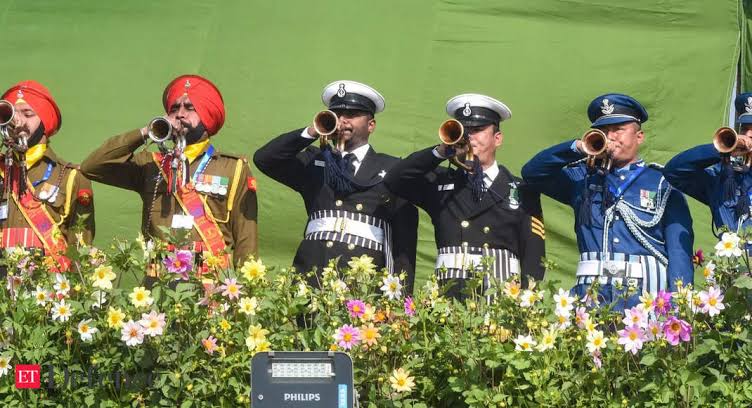Bill finally introduced in Parliament to empower tri-services commanders

By
Colonel Awadhesh Kumar
Ministry of Defence has finally woken up.
The Govt of India approval for creating a tri services National Defence Academy was given on 17 Feb 1948. NDA came into existence with effect 11 Jan 1949 when training of first course of Joint Services Wing commenced. A big lesson learnt from World War2 was that the three Services had to be integrated not only with their men, machine but in their mind also. At that time only India had taken this futuristic step to start the process right at the induction level of the Officer Corps.
Other major countries did not create a tri service Academy but over a period they created various tri services Establishments, joint command and control systems, integrated Theatre Commands and Joint Chief’s/ Chief of Defence Staff system. They did this with appropriate legal system passed by their legislatures to provide Command authority in a joint services organization to the military officers over all other services personnel too.
In India, after approving the raising of NDA, the Defence Services Staff College too started its first course with effect Apr 1948. Though after such rapid progress in joint ness at grass root level, it was only in July 1958, that the Ministry of Defence accepted the need for broad-based training within the country, for senior decision-makers too, on matters related to national security and strategy. The Parliament Estimates Committee established the feasibility of setting up an institution for imparting such training in India, on the pattern existing in other countries with advanced military capabilities.
On May 6th, 1959, the Cabinet Defence Committee approved the proposal for establishing the National Defence College. On September 15, 1959, the Defence Minister issued formal orders, conveying the sanction of the President of India for setting up a National Defence College in India for preparing senior military and civil officers for assuming higher responsibilities in the planning and management of national security and strategy. In July 1959, Lt General K Bahadur Singh was appointed the first Commandant of the College. Finally the first course started on 27 Apr1960.
It seems thereafter elected representatives responsible for providing reforms to higher defence organisation for DEFENCE OF INDIA with proper legislation, went into hibernation. Both the re organization of Higher Defence and integration of the three Services at various levels kept languishing.
Even the 1962 Chinese aggression and 1965and 1971 Indo Pak War brought only cosmetic changes in the higher defence organization and the jointmanship. Then came the Kargil war and things began to move in its aftermath. The Group of Ministers (GoM) report on reforming the National Security System recommended the replacement of the FORTAN, under the Indian Navy, with a Joint Andaman and Nicobar Command to Command and Control all the assets of the tri-services and the Coast Guard on the islands.
The GoM had recommended that the Commander of this Joint Command would report to the proposed Chief of Defence Staff (CDS). The Andaman and Nicobar Command was in place by the end of September 2001 with Vice Admiral Arun Prakash (later CNS) as the first Commander–in–Chief of the Andaman & Nicobar Command (CINCAN).
On 21 Nov 2001 came the HQ Integrated Defence Staff with a Chief of Staff or CISC (Chief of Staff to the Chairman Chief of Staff Committee ) but the boss a permanent Chief of Defence Staff instead of a rotating Chairman, was missing. Next came the Strategic Force Command again a tri Services Command which got raised on 4th Jan 2003 to Command and Control our nuclear weapons. However due to legislation not in place the CISC and the C in C s lacked the real required Command and Discipline authority. The same was the case at NDA, DSSC and the NDC.
Finally came the Chief of Defence Staff on 1st Jan 2020. He would be the permanent Chairman of the Chief of Staff Committee, head the HQ IDS, be the sole military advisor to the Govt / PM/ RM and also be the Secretary of Department of Defence in the Ministry of Defence. However he too lacked the legal authority of Command and Discipline over all three Services and the Coast Guard.
System was managed somehow with no major hiccups till date but now things have began moving towards creation of several joint Theatre HQ wherein legal powers for Command and Discipline over all forces under him must be vested in the theatre C in C. In fact this should be covering all the paramilitary and Central Armed Police Forces placed under command under the theatre.
India stands like Himalayan wall to Protect Bhutan from ChinaSo the Govt has introduced in Parliament a bill to empower the commander-in-chief of a theatre Command or any officer-in-command of any inter-services organisations to maintain discipline and ensure proper discharge of duties among the personnel placed under them.
Shri Rajnath Singh, Raksha Mantri introduced the Inter-Services Organisations (Command, Control and Discipline) Bill, 2023 in the Lok Sabha. The Bill will be taken up for discussion and voting, along with the second batch of supplementary demands for grants for 2022-23, which entails spending for the remaining period of the current fiscal.
This bill is an essential pre requisite for creating the Theatre HQ. Another essential requirement will be to work out the Operational Chain of Command with proper legislation. There cannot be any Grey areas. We can follow either the American System wherein the Chain of Command will be CABINET COMMITTEE SECURITY. . . . RAKSHA MANTRI. . . . (with CDS in loop transmitting all orders ). . . . THEATRE COMMANDER or it can be CCS. . . . . . . . . CDS. . . . . THEATRE COMMANDER.
Time to bite the bullet has come.



